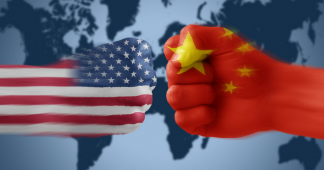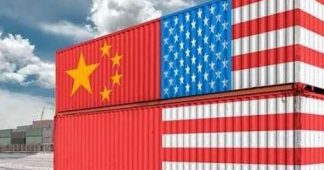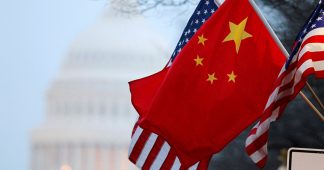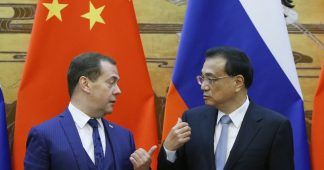By Nick Beams
6 August 2019
Stock markets fell sharply around the world yesterday amid fears of a currency war, after China allowed its currency, the renminbi, to fall below the benchmark of 7 to the US dollar. The move was taken in response to US president Trump’s escalation of the trade war by threatening a 10 percent tariff on an additional $300 billion worth of Chinese goods from September 1.
Late yesterday, the US Treasury named China a “currency manipulator,” signalling that the trade war is escalating into a currency war. It said China has a “long history of facilitating large-scale intervention in the foreign exchange market. In recent days, China has taken concrete steps to devalue its currency, while maintaining substantial foreign currency reserves despite the active use of such tools in the past.”
The US accusation of manipulation stands reality on its head. Chinese authorities have been actively intervening in currency markets, not to drive down the value of the renminbi, but to prevent it falling lest this lead to an outflow of capital. Yesterday’s decision, following the US tariff threat, indicates a reorientation.
Announcing the currency move, which would have been taken after top-level discussions in the government, the People’s Bank of China said the fall was “due to the effects of unilateralist and trade-protectionist measures and the expectations for tariffs against China.”
In a further response, the state-owned Xinhua newsagency reported that Chinese companies had already suspended their purchases of US agricultural products and that the government would “not rule out” imposing tariffs on agricultural products purchased after August 3.
The US decision to further escalate tariffs was taken against initial opposition from US Trade Representative Robert Lighthizer and Treasury Secretary Steven Mnuchin, but was supported by leading anti-China hawk Peter Navarro, according to a report in the Wall Street Journal .
It clearly led to the conclusion being drawn in Beijing’s ruling circles that after more than a year of continuous escalation by the US of trade war measures there was absolutely no prospect of reaching any agreement with Washington and it was necessary to prepare for what President Xi Jinping has characterised as a “long march.”
That assessment would have been reinforced by other events over the past few days. Within hours of the formal withdrawal of the US from the INF nuclear treaty, US Defence Secretary Mark Esper said the US intends to deploy medium-range missiles in the Pacific directed against China. And in subsequent comments, Secretary of State Mike Pompeo directly linked China’s economic growth to its military capacities.
President Trump weighed in with a tweet following the Chinese currency decision to again apply pressure on the US Federal Reserve to undertake major cuts in interest rates. Trump has previously called for the central bank to cut rates in order to boost Wall Street. But the focus is now shifting towards the demand that the Fed cut rates in order to lower the value of the dollar, thereby escalating the trade war to a currency war.
“China dropped the price of their currency to almost an historic low. It’s called ‘currency manipulation.’ Are you listening Federal Reserve?” Trump tweeted.
The news of China’s currency move sent markets falling across the world, starting in Asia, extending to Europe and then to the US. The sell-off on Wall Street went across all sectors, leading to a 3 percent decline in the broad-based S&P 500 index. The Dow fell by 760 points, a decline of 2.9 percent, as markets experienced their worst day for the year. The S&P 500 is at a two-month low, having lost 6 percent since reaching a record high last month.
And in another major development, demand for government bonds, which are seen as so-called safe havens in conditions of economic turbulence, rose sharply with the yield on the 10-year Treasury bonds dropping to 1.735 percent. The fall in the yield (which has an inverse relationship to the price) was a continuation of the trend in evidence for the past three months. Last week saw the biggest weekly decline in 10-year yields since 2012, and since May the 10-year yield has dropped by 0.80 percentage points amid rising trade tensions.
Significantly, the yield curve has continued to invert, meaning that rates of short term bonds are higher than those on longer-term debt. This is taken as one of the surest guides to a recession. The Financial Times noted that the bond market indicator of recessions had “flashed its most bearish signal since 2007,” on the eve of the global financial crisis.
The difference between the yield on three-month Treasury bills and 10 year bonds, inverted by 32 basis points at one stage yesterday, a process which has been seen before every US recession in the past five decades.
In a research note issued yesterday, Morgan Stanley economists said that if the conflict between the US and China lasted for a further four to six months, the global economy would be in a recession in nine months.
Already there are clear indications of a developing recession in Europe, with the president of the European Central Bank Mario Draghi last month describing conditions in manufacturing as getting “worse and worse” as the ECB prepares to announce further monetary stimulus measures.
There is growing concern in US economic and business circles about the continued escalation of Trump’s attacks, reflecting fears that tactics which may have worked in securing deals in the shady world of New York real estate are not applicable to global economics.
Philip Levy, a former member of George W. Bush’s Council of Economic Advisers, told Bloomberg: “We did not enter this particular trade war with China with a clear plan for how to get out. The plan for how to get out appears to have been ‘We’ll threaten them, they’ll succumb and then we’ll be happy.’ So far we haven’t seen anyone talk about that if they don’t succumb?”
The threatened escalation of the trade war into a currency war has major longer-term implications for the state of the entire world financial system under conditions where it is based on fiat currencies, that is, paper money issued by the central banks.
With all major economies now moving to devalue their own currencies, amid the development of recessionary trends and growing economic conflicts, the conditions are being created for a major crisis in the entire monetary system
Published at www.wsws.org/en/articles/2019/08/06









